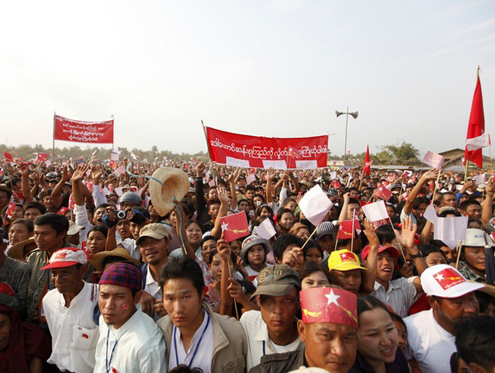Burma’s new law on free assembly is not up to global standards and leaves the door open for abuse by authorities, Human Rights Watch (HRW) warned today.
Permission to demonstrate must be sought five days in advance and applications can be rejected at the discretion of authorities without the possibility of appealing to a court. Even slogans have to be pre-approved and anyone found in breach of regulations face up to one year in jail.
“While ostensibly accepting the right of peaceful assembly, the new law makes the right subject to the overbroad control and the discretion of the authorities,” said HRW.
The law stipulates that permits are required for any gathering of “more than one person in a public area … in order to express their opinions.”
The authorities are required to respond within 48 hours and provide an explanation for rejections. But this can include anything viewed as “contrary to Union security, prevalence of law and order, community peace and tranquillity or public order and morality.” Organisers can appeal to the state or local police authorities, but their rulings are final.
The law also provides criminal penalties of up to six months in prison for various nebulous activities, such as giving speeches containing false information, hurting the state and union or “doing anything that causes fear, a disturbance or blocks roads, vehicles or the public.”
“Burma’s new law on assembly rejects the previous ban on demonstrations, but still allows the government to trump the Burmese people’s basic rights,” said Brad Adams, Asia director at Human Rights Watch.
“There is a lot of excitement about changes in Burma these days, but the government shouldn’t be given credit for allowing some freedom just because none existed before.”
President Thein Sein signed the law in December 2011 as part of a series of democratic reform efforts intended to transform Burma’s international image. The piece of legislation will not come into effect until the Home Affairs Ministry, who campaigners say must clarify existing provisions, issues regulations.
Burma has a long history of suppressing demonstrations, with the bloody massacres in 1988 and 2007 serving as infamous examples. Still, during Thein Sein’s time in office, authorities have interrupted numerous protests, several of them aimed at resource development projects and cases of land grabbing.
On 1 March 2012, nine activists demonstrating against the controversial Gas Shwe project were detained and interrogated by authorities in Rangoon.
“[They] asked us why we were holding the campaign, and told us that we got entangled with the law because we had distributed illegal papers among the public,” explained Daw Mar Mar, one of the activists.
The Burmese government remains very sensitive about criticisms against their resource development policies, especially in ethnic minority areas. At least 25 mega-dams are currently under construction in Burma.
This includes the development of the contentious Hatgyi dam in Karen state, which is reported to be putting the precarious ceasefire at risk. The right of ethnic groups to protest against such controversial developments will be a crucial test for the new legislation.
“The real test [for the] new laws will be to see what happens when Burmese attempt to use them,” Adams said. “Burma’s government will deserve kudos for legal reform only when people are allowed to exercise their basic rights.”



